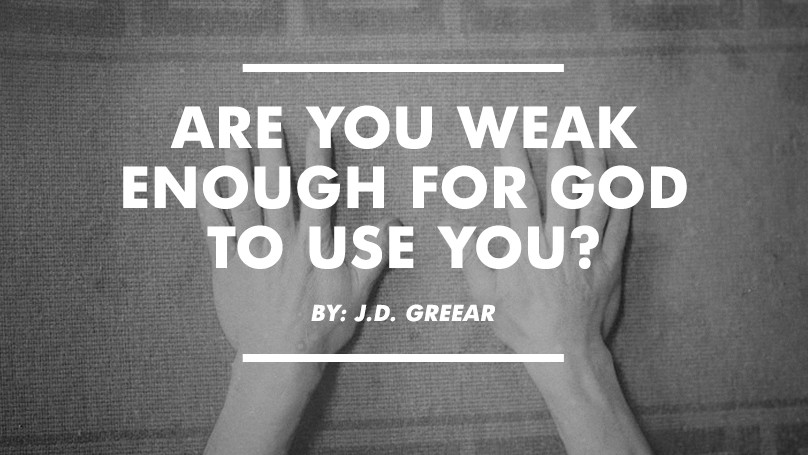There aren’t many societies that praise weakness. Ours is no different. Whether you’re a pastor or a police officer, an on-the-go salesman or a stay-at-home mother, weakness is seen as a liability. Nobody wants to be weak. Strong is the name of the game.
Sadly, our obsession with strength blinds us to a key biblical truth: God uses the weak. It’s so pervasive that you’d be hard-pressed to find a book of the Bible that can’t be summarized this way. And yet despite being hard-wired into the very DNA of Scripture, we don’t really believe it. We still clamor after strength. But God doesn’t need our strength to deliver us. In fact, our strength is actually more of a liability than an asset.
Sadly, our obsession with strength blinds us to a key biblical truth: God uses the weak. It’s so pervasive that you’d be hard-pressed to find a book of the Bible that can’t be summarized this way.
I’ll go a step further: God is so single-minded in his preference for weakness, that when he wants to use us, he often begins by weakening us. Case in point: the Bible’s most courageous coward, Gideon.
Just before heading into battle with the mighty Midianite army, Gideon hears from God: “The people with you are too many for me to give the Midianites into their hand, lest Israel boast over me, saying, ‘My own hand has saved me’” (Judges 7:2). So God gives Gideon a couple of tests, designed to trim the ranks.
Test 1 is to send all the fearful people home. It turns out that’s a decent number, and 22,000 of Gideon’s 32,000 leave. (I wonder if Gideon tried to sneak off with them?) Now, that might not have been a foolish decision. Fear is contagious, so 10,000 brave soldiers are better than three times that many if 70% of them are wimps.
But if Test 1 was designed to create a braver army, Test 2 was only designed to create a smaller and weaker one. God tells Gideon to have his men drink from a stream, and all of the men who “lap like dogs” (who does that?) are the ones that should stay. It’s an arbitrary test, but an effective one: only 300 men remain.
God was teaching Gideon what he wants to teach us today: when he wants to use us, he often begins by weakening us. That doesn’t mean God delights in bringing us pain, or that every instance of weakness in our lives is caused directly by God. But periodically, God will step into our lives and reduce the size of our army, because he wants us to trust him—and that’s often the only way we will.
God was teaching Gideon what he wants to teach us today: when he wants to use us, he often begins by weakening us.
So when we hear a tragic diagnosis from our doctor…or when we suddenly find ourselves out of a job…or when our marriage is on the rocks…we should see those as our “army” being reduced. Those are moments of decision: will we rage against God, or lean into him like never before? We are so obsessed with grasping at strength that pain becomes something to avoid, not an opportunity to learn from. But what if dependence is more important than strength? If dependence is the objective, than weakness is an advantage.
I hate learning that lesson. I’m sure you do, too. But weakness forces us to throw ourselves in desperation before God, and that is the only place—and the only posture—in which we can learn the four words that transform our lives: God is always faithful. You and I may never know that God is all we need until he is literally all we have.
But what if dependence is more important than strength? If dependence is the objective, than weakness is an advantage.
The Apostle Paul said it this way: “I will boast all the more gladly about my weaknesses, so that Christ’s power may rest on me” (2 Cor 12:9). You see, if we brag on our strengths, people may look at us and think, “I wish I were more like that … but I can’t be.” But if we brag on our weaknesses, that makes people think, “Wow, I have access to the same power that guy does!” Christians aren’t people who boast about their superior morality; they are beggars telling a bunch of other beggars where to find bread.
Beware your strengths. They are far more dangerous to you than your weaknesses, because your strengths keep you from hoping in God’s mercy. And boast in your weaknesses. Boast when God lets you fail. Boast when God reduces the size of your army. God isn’t withholding good things from you. In fact, he’s offering you something priceless. As Hudson Taylor said, “God wants you to have something far better than riches and gold, and that is helpless dependence on him.”
For more, be sure to listen to the entire message here.
Published October 8, 2015
